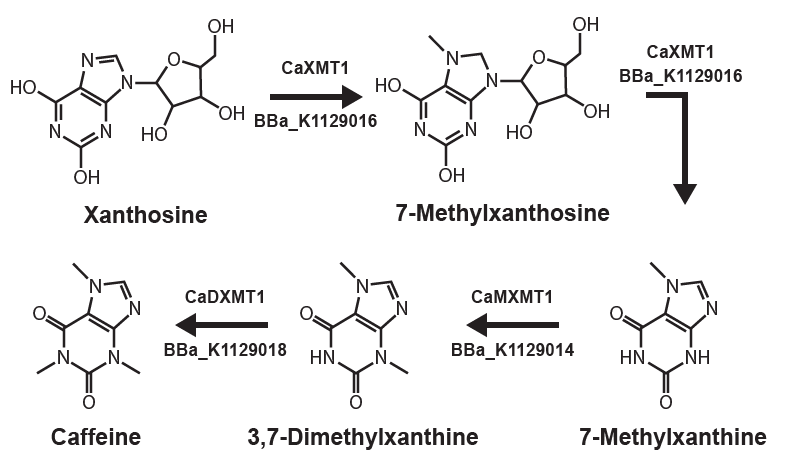Team:British Columbia/Project/Caffeine
From 2013.igem.org
iGEM Home


Contents |
Caffeine
Caffeine (1,3,7-trimethylxanthine) is arguably the most popular stimulant and psychoactive substance consumed in recent times. This is evident from the huge demand for coffee and tea beverages and increasingly energy drinks, all of which are common dietary sources of caffeine (2). Following the trend of increasing consumption, much research into caffeine’s effects on health and cost-effective methods of production have been done.
Currently, methods of isolating caffeine for use as an additive include the decaffeination of commercially harvested plants, such as green tea leaves and Coffea arabica beans. The main enzymes for caffeine biosynthesis, and thus caffeine itself, accumulate in seeds, cotyledons, and leaves of these plants (5). This is an expensive process involving large quantities of organic solvents or water, or specialized techniques such as supercritical fluid extraction with carbon dioxide (1).
The ecological and financial burden of current caffeine production methods makes an alternative approach (microbial synthesis via synthetic biology) desirable. While there has been significant research done on the degradation of caffeine using microbes (3, 4), synthesizing caffeine in a biological chassis is less common in the literature. Our goal was to implement the caffeine biosynthetic pathway (using xanthine as substrate) in E. coli to enable the production of caffeine in a bioreactor. This is largely building on the work of the 2012 TU Munich team, which successfully got caffeine precursors expressed in yeast.
Rationale
Tying in with the immunization of bioreactors using the CRISPR system, the caffeine biosynthetic pathway serves as part of a proof-of-concept showing that the CRISPR system could be used to alter population dynamics in bioreactors.
Chemistry

Characterization
Sources
(1) http://www.tandfonline.com/doi/full/10.1080/15422119.2013.771127
(2) http://link.springer.com/chapter/10.1007/978-1-4419-0338-9_26
(3) http://connection.ebscohost.com/c/articles/79461823/biodegradation-caffeine-by-trichosporon-asahii-isolated-from-caffeine-contaminated-soil
(4) https://www.jstage.jst.go.jp/article/bbb1992/57/8/57_8_1286/_article
 "
"